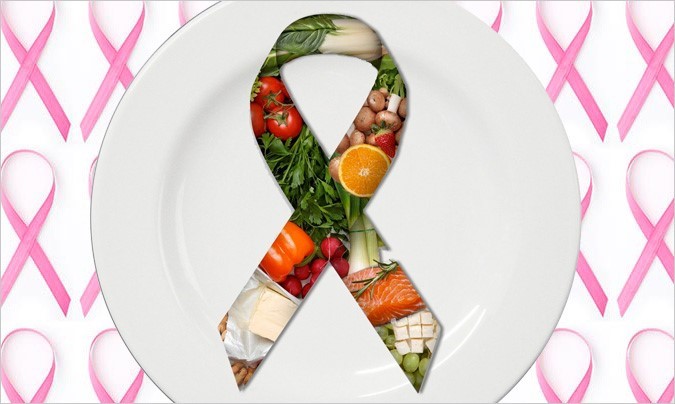Nutrients Benefits During Cancer Treatment
Nutrients Benefits During Cancer Treatment
Proper nutrition is especially important if you have cancer, because both the disease and its treatment can change the way you eat. They can also affect how the body tolerates certain foods and uses nutrients.

Nutritional needs of people with cancer are different in different people. Eating well means eating a variety of foods to provide the nutrients your body needs to fight cancer. These nutrients include proteins, fats, carbohydrates, vitamins, water and minerals, the important points of each of which are listed below:
Proteins
We need protein to grow, repair body tissue and keep our immune system healthy. When your body doesn't get enough protein, it may break down muscle for the fuel it needs. This makes recovery from the disease take longer and reduces the resistance to infection. People with cancer often need more protein than usual. After surgery, chemotherapy, or radiation therapy, extra protein is usually needed to repair tissues and help fight infection. Good sources of protein include fish, chicken, eggs, low-fat dairy, nuts, and some legumes.
Fats
Fats play an important role in nutrition. Fats and oils are a rich source of energy for the body. The body breaks down fats and uses them to store energy, insulate body tissues, and transport some types of vitamins through the blood. You may have heard that some fats are better for you than others. It is better to be very careful in choosing fats, choosing polyunsaturated oils such as canola oil and monounsaturated oils such as olive oil is the best choice for you. Consuming solid and hydrogenated oils such as frying oils is extremely harmful for people with cancer and carries many risks. These oils are also abundant in food such as animal and vegetable butter and fast foods. Therefore, they should be removed from the diet of these people. Also, these people should not use oils that are prepared manually, such as sesame oil. Saturated fats are mainly found in animal sources such as meat and poultry, whole milk, fat, butter and cheese. Some vegetable oils such as coconut, kernel oil and palm oil are saturated. Saturated fats can raise cholesterol and increase the risk of heart disease. Sources of trans fats include snack foods and baked goods made with partially hydrogenated vegetable oil or vegetable shortening. Trans fats are also found naturally in some animal products such as dairy products. Trans fats can increase bad cholesterol and decrease good cholesterol. Avoid trans fats as much as you can.
Carbohydrates
Carbohydrates are the body's main source of energy. Carbohydrates provide the fuel needed by the body for physical activity and the proper functioning of organs. The best sources of carbohydrates - fruits, vegetables and whole grains - also provide vitamins and minerals, fiber and plant nutrients needed by body cells. Fiber is the part of plant foods that the body cannot digest. But it has a great effect on the health of the body and the elimination of toxins and maintaining the weight of cancer patients. It is better to avoid sources of simple carbohydrates, including white bread, white rice, non-whole meal pasta, and simple refined grains, as much as possible. Also, sweets (such as desserts, candies and drinks containing sugar) should also be avoided.
Food supplements
During the affliction to cancer, taking all kinds of supplements such as iron, multi-mineral supplements, vitamins and other food supplements should be avoided and taking them should only be done with the advice of a specialist doctor. Excessive intake of some supplements is associated with the risk of cancer recurrence or worsening of symptoms and complications.
To get more information on nutrition, you can visit the Breast Diseases Clinic of Motamed Jihad Academic Research Institute or contact the numbers below.
Consultant contact number: 021-66404020 / 09124885127
References:
- Donaldson, M.S., Nutrition and cancer: a review of the evidence for an anti-cancer diet. Nutrition journal, 2004. 3: p. 19-19.
- Aghajanpour, M., et al., Functional foods and their role in cancer prevention and health promotion: a comprehensive review. American journal of cancer research, 2017. 7(4): p. 740-769.
- Rauh, S., et al., Nutrition in patients with cancer: a new area for medical oncologists? A practising oncologist's interdisciplinary position paper. ESMO open, 2018. 3(4): p. e000345-e000345.
- Mardas, M., R. Madry, and M. Stelmach-Mardas, Link between diet and chemotherapy related gastrointestinal side effects. Contemporary oncology (Poznan, Poland), 2017. 21(2): p. 162-167.
- Coa, K.I., et al., The impact of cancer treatment on the diets and food preferences of patients receiving outpatient treatment. Nutrition and cancer, 2015. 67(2): p. 339-353.
Compiled, written and translated by:
Dr. Ahmad Fazilat
Faculty member, Dept of Genetics, Motamed Cancer Institute, ACECR



